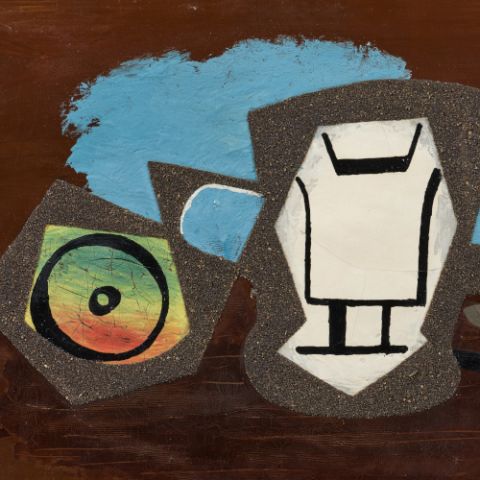
Lot 33 | Yves Klein | Monochrome Rouge (M66)
1928 Nice - 1962 Paris
Title: Monochrome Rouge (M66).
Date: 1957.
Technique: Mixed media on beaverboard.
Measurement: 18 x 12cm.
Notation: Monogrammed and dated verso centre: YK (artist's signet) 57.
Frame/Pedestal: Display case.
Provenance:
- Private collection North Rhine-Westphalia
Literature:
- Ledeur, Jean-Paul (ed.): Yves Klein - Catalogue raisonné des éditions et sculptures éditées, Knokke-Le-Zoute, 2000, cat. rais. no. M66
- Beautiful, small monochrome work that reflects Klein's approach of absolute abstraction and immateriality
- Privately owned for decades and offered on the art market for the first time
- Klein exhibited in Germany for the first time at the Alfred Schmela Gallery in Düsseldorf in 1957
- Yves Klein regards the colour red as a "psychological space" that radiates fire and heatindly confirming the authenticity of this work
Judo master and devotee of absolute abstraction
In 1957, the Italian art critic Dino Buzzati described the eccentric personality of Yves Klein, who was active in many different fields, as follows: “Born in Nice twenty-eight years ago; studied nautical science and oriental languages; trained racehorses; judo champion in Japan itself” (Buzzati, Dino: “Blu, Blu, Blu!” Corriere d'Informazione, January 9, 1957). After returning to Paris in 1955 with a black belt from Tokyo, but without the hoped-for fame, Klein turned to a career as an artist, which he pursued intensively until his premature death in 1962. He became interested early on in the psychological impact and meaning of individual colors, which he explored in his first austere monochromatic paintings, which were free of lines, figuration, and compositional constraints.
His work, imbued with philosophy and spirituality, is based on a notion of absolute abstraction that brooks no distractions from a decorative juxtaposition of different colors. In his quest for the complete dissolution of any secondary effects, Klein therefore reduced his palette until he finally concentrated on a single color: blue. This ultramarine blue, developed by him and patented in 1960 as “International Yves Klein Blue”, embodies the pure color, unbound to any object or idea, and thus completely free, appearing in the matt-glowing pigment as a physical concentration of cosmic energy.
At the age of 18, Klein created his “first infinite and immaterial painting, lying on the beach at Nice, signing the blue Mediterranean sky and declaring it his first and greatest ‘monochrome’.” (Yves Klein quoted in: Stich, Sidra: Yves Klein. Stuttgart: Cantz, 1994. p. 19) Klein was influenced by the Christian mysticism of cosmogony, which prophesied the end of the age of physical matter and the restriction of the mind by form, as well as the liberation of rational consciousness. Also influenced by judo and the teachings of Zen Buddhism, he sought to achieve states of mental emptiness and, from 1957, turned more and more consistently to the dematerialization of his painting, until it finally became perceptible only as atmospherically vibrating color, as the “full emptiness, the nothing that encompasses everything possible.” (Pierre Restany quoted in: Stich, Sidra: Yves Klein. Stuttgart: Cantz, 1994. p. 81) In his 1958 exhibition “Le Vide” at the Galerie Iris Clert in Paris, Klein took another radical step. In order to give the invisible an effect through the perceptible, he presented the completely emptied gallery space as a work, thus elevating the concept to the essence of art.
“The fire that radiates heat”
Between 1955 and 1957, Klein experimented with techniques and materials. The resulting works featured a range of colors, including red, green, orange, yellow, black, white, violet, bronze, pink, as well as vermilion, and formats that often had rounded corners and canvas stretched over the side edges, intended to enhance the impression of the expansive monochrome color space. The year of the small-format “Monochrome Rouge” coincides with the zenith of this abstraction, which Yves Klein elevated to immateriality, and marks the beginning of his exclusive use of the blue hue. In 1957, his work was shown for the first time in Germany, where it was exhibited by avant-garde gallerist Alfred Schmela. In Düsseldorf, Klein got to know the members of the ZERO group, initially Otto Piene and Heinz Mack, and later Günther Uecker, who had turned away from ideologically burdened figuration and narration and wanted to start “from scratch”. Klein also pursued the goal of creating a new sensibility by heightening our perception of reality and, together with artists such as Arman, Daniel Spoerri, and Jean Tinguely, founded the “Nouveau Réalisme” movement in 1960.
Although small in size, the power of the color effect of the penetrating red surface of “Monochrome Rouge” draws the viewer's gaze into the depths. Klein also conceives of red as a “psychological space” that means “the fire that radiates heat” (Stich, Sidra: Yves Klein. Stuttgart: Cantz, 1994. p.78). The devout Catholic had a profound knowledge of the symbolism of color in Christian iconography and, with his use of the color triad blue, yellow and pink/red in a modification of the primary colors, blue, yellow and red, he also establishes a reference to the Holy Trinity.
Bettina Haiss.
Modern, Post War & Contemporary Art
+49 221 92 58 62 300
Print this lot | Recommend lot |
Conditions of this Lot
32% buyer’s premium on the hammer price
Estimated shipping costs for this lot:
Arrangement after the auction.
Yves Klein Nouveau Réalisme Post-War Art Post War 1950s Display case Colour Painting Mixed media




